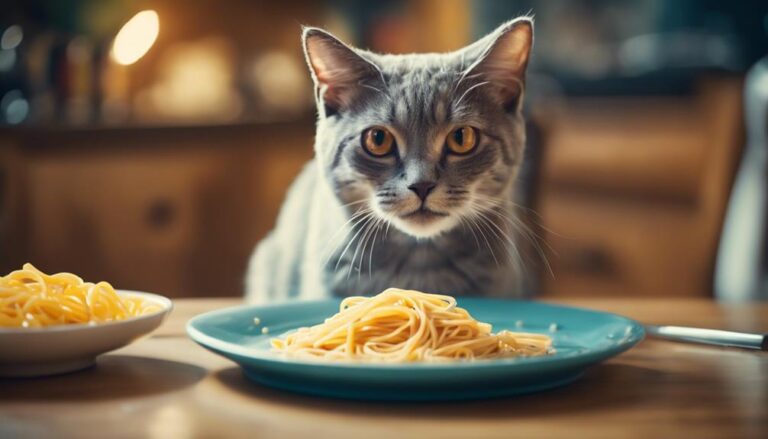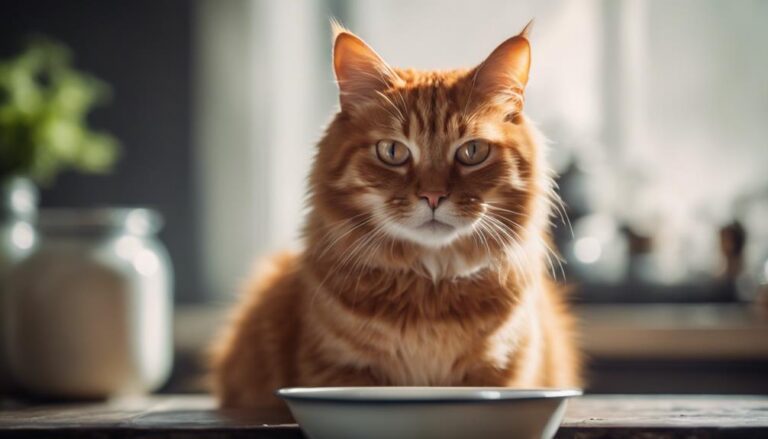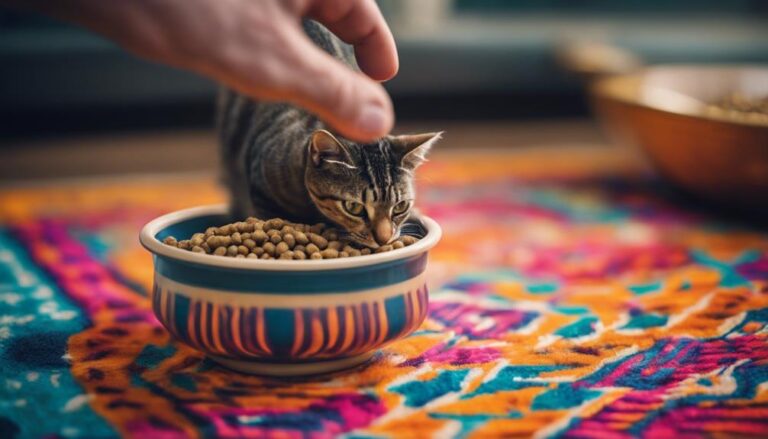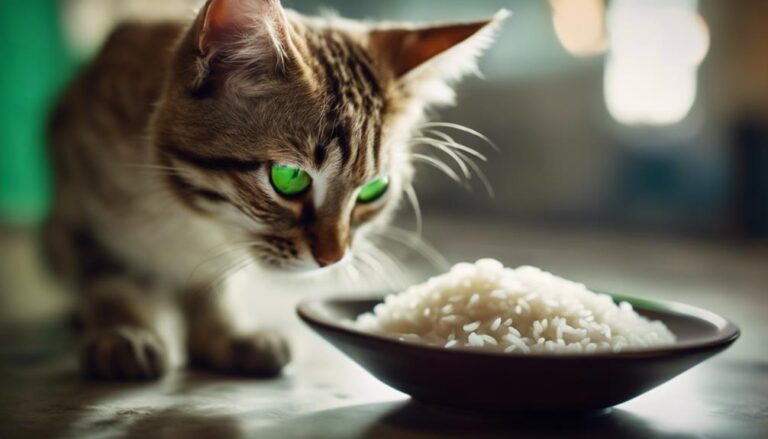If you're considering sharing some gingerbread with your feline friend, you might want to pause and reconsider. While cats have a curious palate, the ingredients in gingerbread could pose potential risks to their health. Certain spices commonly found in gingerbread can have adverse effects on your cat's well-being. Before you decide to offer them a taste, it's essential to be aware of the potential dangers lurking in that festive treat. So, should you be cautious or let them indulge?
Potential Dangers of Gingerbread for Cats
When considering whether cats can eat gingerbread, it's crucial to understand the potential dangers it poses to their health. While cats may be curious about this festive treat, it's best to avoid feeding them gingerbread due to several risks. Even in small amounts, gingerbread can lead to an upset stomach in cats. The spices commonly found in gingerbread, such as nutmeg, cinnamon, and cloves, can have harmful effects on your feline friend.
Nutmeg, often used in gingerbread recipes, can cause stomach upset, increased blood pressure, and even seizures in cats. Cinnamon, another common ingredient, can result in diarrhea, vomiting, and mouth blisters when consumed in excess by cats. Cloves contain eugenol, which is known to cause liver toxicity in cats. Since cats lack the necessary enzymes to efficiently break down sugars like those found in gingerbread, it can not only lead to stomach issues but also potentially contribute to diabetes over time.
Therefore, it's best to keep gingerbread away from your curious feline companion to ensure their well-being.
Harmful Ingredients in Gingerbread for Cats
Avoid feeding your feline friend gingerbread due to its toxic ingredients like nutmeg, cinnamon, and cloves, which can lead to digestive problems, liver damage, and toxicity.
Raisins, another common ingredient, can also be harmful to cats, potentially causing kidney failure.
Be cautious of these harmful components in gingerbread as they can pose serious health risks to your beloved pet.
Toxic Spices in Gingerbread
Toxic spices found in gingerbread, such as nutmeg, cinnamon, and cloves, can pose serious health risks to cats. Nutmeg in gingerbread cookies may lead to upset stomach, increased blood pressure, and seizures in cats.
Cinnamon, another common spice in gingerbread, can result in diarrhea, vomiting, and mouth blisters for your feline friend. Cloves used in gingerbread contain eugenol, which can cause liver toxicity in cats.
These toxic ingredients can trigger adverse reactions in your pet, making gingerbread potentially harmful to their health. Due to cats' inability to process certain spices and sugars, indulging in gingerbread can lead to stomach upset and even diabetes.
It's best to keep this festive treat away from your cat to ensure their well-being.
Raisins and Cats
In gingerbread, raisins are harmful ingredients that can be toxic to cats and should always be avoided. Even small amounts of raisins can cause serious harm to your pet cat.
Consumption of raisins can lead to kidney failure in cats, resulting in symptoms such as vomiting, diarrhea, and lethargy. It's crucial to keep gingerbread and other foods containing raisins away from your cat to prevent any potential health issues.
Remember that what may be a tasty treat for you can be extremely dangerous for your feline friend. Prioritize your cat's well-being by ensuring they steer clear of raisins and any gingerbread that may contain them.
Nutmeg and Cats: Risks and Effects
Occasionally, cats may experience adverse effects when exposed to nutmeg found in gingerbread, including upset stomach, increased blood pressure, and even seizures. It's crucial to be aware of the risks associated with nutmeg and cats to prevent potential harm. Here are some key points to consider:
- Upset Stomach: Nutmeg can irritate your cat's stomach lining, leading to symptoms like vomiting and diarrhea.
- Increased Blood Pressure: Consumption of nutmeg can elevate your cat's blood pressure, causing cardiovascular issues.
- Seizures: In severe cases of nutmeg toxicity, cats may experience seizures due to the myristicin content in nutmeg.
In the event of nutmeg poisoning, immediate veterinary intervention is necessary to address the symptoms and provide appropriate treatment. To safeguard your feline companion's well-being, it's best to keep gingerbread and other nutmeg-containing foods out of their reach. Prioritizing your cat's safety by avoiding potential hazards like nutmeg is essential for maintaining their health and happiness.
Cloves in Gingerbread: Toxicity in Cats
When considering the potential risks associated with nutmeg for your cat, it's important to also be cautious about the presence of cloves in gingerbread due to their toxicity to felines. Cloves contain a toxin called eugenol, which can lead to liver toxicity in cats. Consumption of large quantities of cloves can cause adverse reactions like vomiting and seizures in cats. The toxicity in cats usually occurs when they ingest whole cloves or clove oil. Cats may be sensitive to eugenol in cloves, making it necessary to be careful about their exposure to this substance.
To ensure your cat's safety and well-being, it's crucial to avoid feeding them gingerbread that contains cloves. Clove toxicity can result in upset stomach, liver issues, and other health complications in cats. Being mindful of the ingredients in your cat's diet, especially when it comes to potentially harmful substances like cloves, is essential for maintaining your pet's health.
Gingerbread Alternatives for Cats
Consider offering plain cooked meat like turkey or chicken as a safe alternative to gingerbread for your feline friend during the holiday season. When looking for gingerbread alternatives for cats, keep in mind their health and well-being.
Here are some safe options to consider:
- Catnip Treats: Catnip treats can be a festive and enjoyable option for cats instead of gingerbread. These treats can provide a fun and stimulating experience for your feline companion during the holiday season.
- Cat Grass: Providing cat grass as a natural and safe treat for some cats can offer a holiday-themed snack alternative. Cat grass not only serves as a treat but also aids in digestion and can help prevent hairballs.
- Interactive Treat Toys: Invest in interactive treat toys for cats to enjoy during the holiday season. These toys can keep your cat engaged and entertained while also allowing them to work for their treats, promoting mental stimulation and physical activity.
Remember to ensure that any holiday treats offered to cats are safe, suitable, and beneficial for their overall well-being.
Health Benefits of Fresh Ginger for Cats
Fresh ginger can benefit your cat in various ways. It can help with digestive issues, boost immunity, and offer anti-inflammatory properties. When adding grated fresh ginger to your cat's diet, it's essential to do so in moderation to maximize these health benefits. Remember that even small amounts can contribute to your feline friend's overall well-being.
Ginger for Cat Digestion
Incorporating grated fresh ginger root into your cat's diet can promote better digestion and overall health. Here are some reasons why ginger can be beneficial for your feline friend:
- Alleviates Digestive Issues: Fresh ginger can help with problems like indigestion, stomach aches, and nausea in cats.
- Aids with Motion Sickness: Ginger can provide relief and comfort to cats experiencing motion sickness.
- Holistic Remedy: Some holistic veterinarians suggest using ginger as a natural remedy for digestive problems in cats.
Ginger Boosts Immunity
To enhance your cat's immunity, fresh ginger offers valuable anti-inflammatory and antioxidant properties that can benefit their overall health and well-being. Ginger can aid in supporting your cat's immune system, helping to combat infections and reduce inflammation.
The antioxidants present in ginger, particularly the active compound gingerol, contribute to boosting your cat's health. By incorporating small amounts of fresh ginger into your cat's diet, you may help alleviate gastrointestinal issues and promote better digestion.
Consider grating fresh ginger and adding it to your cat's food to provide potential health benefits for immune system support. Keep in mind that moderation is key when introducing new foods to your cat's diet to ensure their well-being.
Anti-Inflammatory Properties of Ginger
Consider consulting a veterinarian before introducing ginger into your cat's diet to ensure proper dosage and safety for your furry friend.
Fresh ginger possesses anti-inflammatory properties that can aid cats in reducing inflammation, particularly beneficial for managing conditions like arthritis. The active compound gingerol found in ginger is responsible for these anti-inflammatory effects in cats. By incorporating small amounts of fresh ginger into your cat's diet, you may help alleviate symptoms associated with inflammatory conditions.
Ensuring the right amount and form of ginger is crucial, as excessive consumption can lead to adverse effects. Prioritize your cat's well-being by seeking professional advice when considering the inclusion of ginger to address inflammation in your feline companion.
- Fresh ginger contains anti-inflammatory properties beneficial for cats.
- Ginger can assist in easing arthritis symptoms in cats.
- The active compound gingerol in ginger contributes to its anti-inflammatory effects.
Frequently Asked Questions
Is Gingerbread Safe for Pets?
Gingerbread isn't safe for pets. Nutmeg, cinnamon, and cloves in it can be toxic. Nutmeg causes upset stomach, increased blood pressure, seizures. Cinnamon leads to diarrhea, vomiting, mouth blisters. Cloves cause liver toxicity. Avoid feeding gingerbread to your pets.
Can Animals Eat Gingerbread?
Animals shouldn't eat gingerbread. Harmful ingredients like nutmeg, cinnamon, and cloves can cause digestive problems and poisoning. Frosting and decorations are also risky for pets. Keep your furry friend safe by avoiding gingerbread treats.
Is It Safe for Cats to Eat Ginger?
Eating gingerbread is unsafe for cats. Nutmeg can cause upset stomach, increased blood pressure, and seizures. Cinnamon may lead to diarrhea, vomiting, and mouth blisters. Cloves can cause liver toxicity. Avoid gingerbread to keep your cat healthy.
Can Cats Eat Ginger Cake?
Avoid feeding ginger cake to cats. Ingredients like nutmeg, cinnamon, and cloves can be harmful. Nutmeg may cause digestive issues, cinnamon can lead to vomiting, and cloves contain toxins. Choose safer treats for your feline friend.






